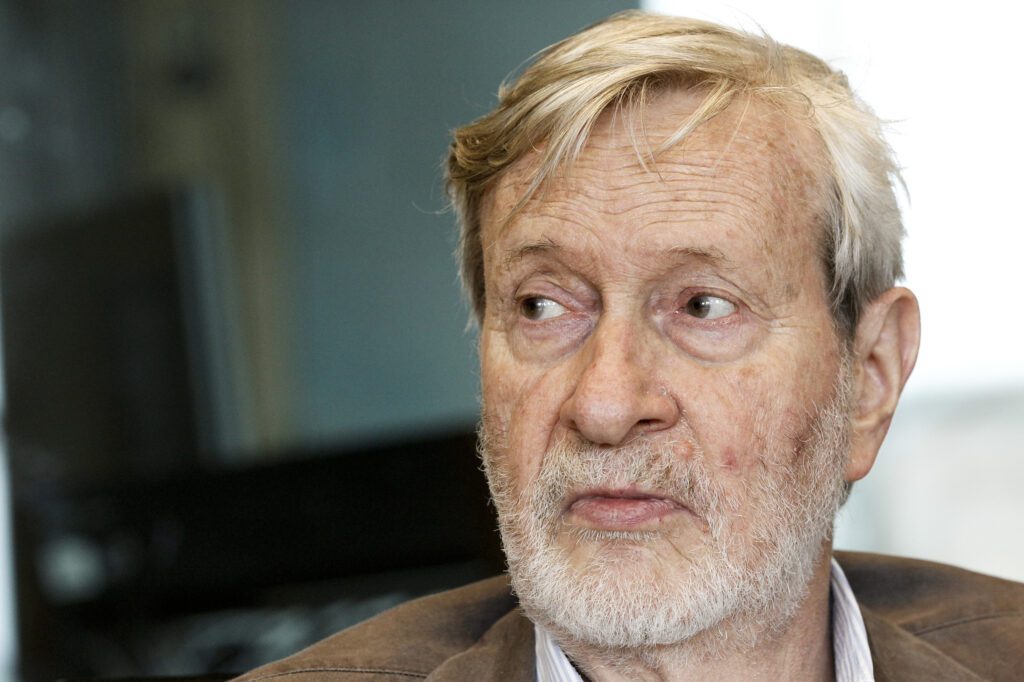
Photo: Thierry Roge © European Union 2012 – Source: EP
The prominent Italian intellectual and politician, Gianteresio (Gianni) Vattimo, died recently.
Throughout his stellar career, he worked as a professor of aesthetics and theoretical philosophy, was a one-time member of the European Parliament, and militated in communist as well as other political groupings. He defended, among other causes, Hugo Chavez’ Venezuela and the removal of Hamas from the EU’s terrorist list.
His work as the originator and popularizer of what he called il pensiero debole (weak thought) represents perhaps the most significant recent development in Nietzschean postmodern ideas.
For those anchored in Christian tradition, Vattimo’s is a particularly noteworthy career, given that it purports to share this anchor even as it sails into perilous waters.
Fundamentally, the Piedmontese intellectual’s weak thought claimed that inquiry into ‘Being’ has to end by admitting the absolute indeterminacy of its subject. That there is no ultimately positive content ascribable to ‘being as such,’ so that, as we draw closer to the mystery of God, we will not only encounter apophatic (‘unspeakable’) beatitude, inexpressible in human language, but also the absence of any real basis for settling on some definite structure that the ‘good life’ ought to have.
Our criterion for determining the desirability of a thing, then, ends up being how desirable it is when perceived from within this ethos. We are delivered unto an elevated (or glorified) sentimentalism. The ethical is that which contributes to the dissolution of barriers and forms whose existence has no basis in what weak thought understands as the truth of being: precisely its lack of truth or, if we prefer, of fixity.
In some sense, it is an ethic that understands compassion as the erasure of distance and definition. Herbert Marcuse defended a similar position, for example, in recommending that environmental activism proceed in terms of an erotically directed death drive (his framework being Freudian), a drive of caretaking, and, we might say, ‘melting together’ with other human beings and the natural world.
Other ways of defining il pensiero debole are peripheral to this central philosophical position. We will find “weakness” described in terms of the vertiginous complexity of modern knowledge, the highly specialized nature of different areas of modern life, the multiplication of cultural frames available to us through modern technology, and the accumulation of historical and sociological data, such as to render up the conclusion that the way things are is merely “the way things have been done.”
As for the Christian legacy, if Nietzsche understood Christianity as a step towards the secular, Vattimo makes this claim the basis for his pseudo-religiosity. The ‘weakness’ of ‘being’ finds its narrative icon in a (twisted) reading of the Gospel according to which ‘god’ emptied himself, revealed himself empty, and died.
This is very nearly Slavoj Zizek’s case for a “Christian atheism” in The Monstrosity of Christ: ‘god’ died—which is to say, the cross revealed the absence of the transcendent ‘god’—and we have only the compassionate community, the sorrowful witnesses of the death of an innocent, whose hearts are kindled to care for each other.
For Vattimo, the secular dissolution of religion is religion’s fulfillment. Such is the deconstructive potential of a certain strand of Christian thought, which, some would argue, accounts for the rise of materialist modernity in the West, precisely among (post-) Christian peoples.
The truth—or aboriginal un-truth—of reality itself is best aligned with a culture that “turns to steam,” as Marx said, that kills R.R. Reno’s “strong gods.”
Regarding his appeal to theistic language, we may criticize Vattimo as having traveled only part of the apophatic way. The central claim of classical metaphysics is that every existent thing is an instant (a manifestation) of unity; oneness is the first and most basic reality. Thus the neo-Platonic ‘One,’ To Hen, as the title for ho Theos, ‘the God.’
It is not, then, by denying their unity and their coherence (as things in themselves and in harmony with others) that creatures become expressive of God, but by understanding whence their existence as particular entities and ability to relate to other particular entities come. Apophatic mysticism is not at all necessarily ethically antinomian or politically revolutionary.
The claim that God is beyond form and so we ought not value formal unities is as absurd as one who, noting that human reason is universal, begins to insist that all human beings should, for that reason, speak the same language.
What creatures are called on to deny, following a mystical interpretation of Christ’s overcoming of the cross, is their pretense to being ultimate and to exhausting God’s creative power. God’s being is not identical with any existence, but it is the fundamental reality of all existences.
Vattimo’s work provides us with ample opportunity to understand how (mystical, philosophical) truth can be misunderstood and misapplied at the service of politically destructive projects (in his case, that of a postmodern-communist pseudo-Christianity).
